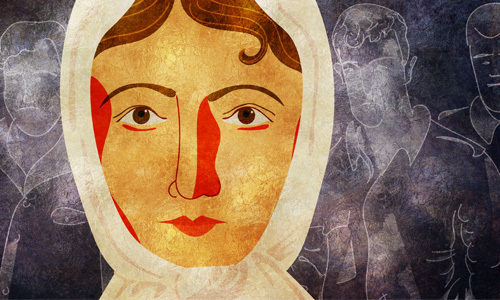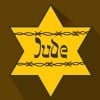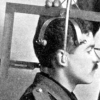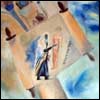On May 15, 1945, I was alone in my family’s room in Moscow when the heavy oak door opened and there, framed by the beige doorposts like a painting, stood Aunt Mania. She was wearing a brown skirt and cream-colored blouse, and her hair was covered with a multicolored kerchief. She was smiling. She gave me a signal with her eyes, and made a pronouncement that she often made: “Well, my dear child, we have to take the bad along with the good in life.” Aunt Mania sighed, then smiled and grabbed my hand saying, “Come, let’s go.”
The electricity in the stairways between the floors didn’t work, so we headed down the five flights of stairs in the dark. While we were making our way down, Aunt Mania told me that we were going to a parade. I held my aunt’s hand as we made our way into the beautiful spring sunlight, and then through the city streets.
The sight that greeted us was not at all what one would expect to see at a parade. There was no music, no cymbals, no clown twirling batons and making people laugh, letting everyone know what was being celebrated. In fact, it soon became clear to me that this was not a parade at all, but a procession of enemy prisoners of war who had been captured by Russia.
There was a crowd of people behind the police rope that ran along a wide, long avenue. The avenue was decorated with red banners bearing the Communist symbol of a hammer and sickle, and the crowd stood silently, with drawn faces, watching the procession along the avenue.
In the front of the procession, riding a brown stallion, was a man in a green uniform. His head was hanging down to his chest. Third Reichmedals decorated his uniform. His face was a dull gray color, and his eyes were the color of sand. His bent body seemed like it was about to fall off the horse to the ground under the animal’s hooves.
Behind the man and his horse, walking on foot, were the Third Reich’s soldiers.
“That is Field Marshal Paulus,” Aunt Mania whispered in my ear.
“Who is he? Why is he there on a horse, Aunt Mania?”
“He is the general of all the generals in the German army,” Aunt Mania replied, “the most grand general that the Nazis have, and that’s why he is riding on a horse. He is leading them.”
“Oh, in the German army, the grand general rides on a horse and the soldiers walk on foot? Is that right, Aunt Mania?” I asked.
“Well, I don’t know if it’s right or not right, but that’s the way it is at this moment, child,” Aunt Mania answered somewhat irritably.
A man who was standing behind us overheard our exchange and contributed his own observation about the Nazi general and his horse. “He doesn’t look so grand today, doesn’t he, Auntie? His horse looks grander than the rider. Isn’t this so, Auntie?”
I looked at the horse on which this general of all the generals of the Nazi army was riding. Indeed, the horse’s long tail waved and slapped the air around it, as though he were announcing to all, “Look at me. See how handsome I am! Have you ever seen a grander horse!?”
Behind the dismal-looking general on his wonderfully handsome horse walked the Nazi prisoners of war. A column of men, perhaps 30 abreast, marching down the wide Moscow street. Some of the marching prisoners were wearing red kerchiefs to protect their heads; some had bent backs like old men; and some wore torn shoes with their toes sticking out.
As I scanned the wall of prisoners, my eyes fell on one who looked a bit different from the others. His face, including his eyes, looked yellow in the sunlight. His orange shirt was torn, and peering out of the holes of his boots were his toes, looking like little light-colored birds in a dark nest.
For a moment, I felt empathy for this person in a torn shirt and destroyed boots. But then, the man who had spoken to my aunt earlier spat on the pavement and accompanied his spitball with the words: “The accursed Nazis. They killed my boy.”
Other people in the crowd picked up his cry. “Yes, and mine, and mine. My Jewish daughter-in-law. They pulled her out of her home in front of her babies and murdered her.”
One woman wearing a red kerchief, like the ones many prisoners wore, had apparently come prepared with garbage. While the other people in the crowd were lamenting the cruel treatment of innocents by these Nazis, she aimed a potato peel, then an onion peel, and then more and more potato and onion peels, at the column of prisoners. (As food was scarce in Russia shortly after the war, I assume that she must have collected her peels from her garbage can, as well as those of her neighbors.) The Russian guards came dashing toward the woman with the garbage and ordered her to stop throwing. She did.
I raised my eyes and, suddenly, felt a huge ball of fear hardening in my gut. The Nazi with the torn shirt and toes like birds was staring at me. His yellow eyes pierced the distance between us, and I thought that with some evil magic power that Nazis possessed he would annihilate me, like those other Nazis who had killed the innocent people mourned by the crowd.
I don’t know how long I stood frozen with fear, not thinking. Then I turned away with the intention to run. I didn’t know where I was going to run to, but one thing was clear to me: I had to get away from the monster who was staring at me.
I tried to move. My legs felt heavy. I forced them to take a step away from the dark column. I forced my legs to take another step and yet another step. I heard voices around me. “They murdered our boys. But our boys in Stalingrad made mincemeat out of them in the end. Nothing stopped our brave soldiers in Stalingrad. Our soldiers in Stalingrad are our heroes. They won the war for the whole world. Europe, Asia, even America.”
My fists clenched inside my pockets. My aunt’s hand was on my shoulder now. “What’s the matter with you, child? Where are you going? We have to take the good with the bad in life.”
I looked at Aunt Mania, and my mouth wouldn’t open to tell her that I was afraid and that I was running away from a monster. And then, unexpectedly, I wiggled out of my aunt’s grasp, turned back, and took a step toward that which had been so fearful only a moment earlier.
Apparently, there was a delay in the movement of the column, as the man with the yellow eyes was still there staring at me. I stared back. I did not want to be afraid, just like the soldiers who fought in the war were not afraid. They were heroes. Surely, they took the good with the bad in life. Perhaps I could learn to be a hero, too.
The yellow eyes of a Nazi prisoner locked with the dark brown eyes of a little Jewish girl. “I shall never be afraid of Nazis again, and I shall never run away again, dear Aunt Mania,” I said. “I yearn to be a hero like the good soldiers.”








Join the Discussion